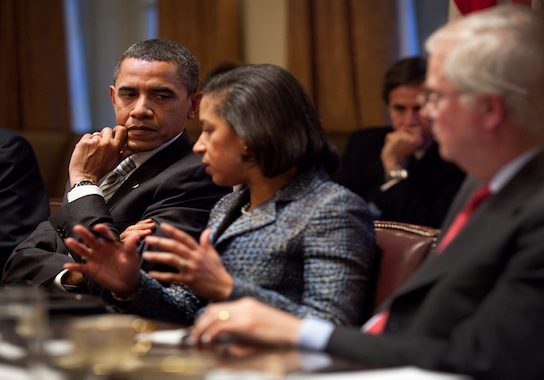The Failure of the Libyan War and the ‘Responsibility to Protect’

Benjamin Friedman also doesn’t buy Hamid’s defense of the Libyan war:
Unfortunately, Hamid’s argument ignores the stated rationales for intervening, including his own [bold mine-DL], relies on a factually-challenged counterfactual to examine the consequences of staying out, and dodges the analysis of critics who predicted how intervention would increase Libya’s disorder.
I agree with Friedman’s response, and it touches on many of the same points I made earlier this week. Not only does Hamid ignore what opponents of the war said at the time and since then, but he puts arguments in our mouths that we never used. He faults opponents of the war for judging it by an unrealistic standard, which he defines as “Libya quickly becoming a stable, relatively democratic country,” but that isn’t the standard that critics of the war use. We judge the war on its own terms according to the official justifications for the war, and on those terms it is clearly a failure. As I said Tuesday, the one thing it did succeed in doing was overthrowing the regime, which the war’s leading supporters explicitly ruled out when the war began.
This “humanitarian” intervention was nothing of the kind, since it caused more harm to the civilian population of a country than it prevented. Because the supporters emphasized the war’s “humanitarian” justification, it’s important to remember how shoddy that justification was. The case that the war was necessary to prevent a massacre was quite weak, but beyond that it failed to take seriously the likelihood that the country as a whole would end up much worse off as a result of intervention. Now that the country is demonstrably worse off than it was, the war’s supporters are eager to deny any connection between the chaos of post-Gaddafi Libya and the war they supported to remove him from power.
It’s worth going back to one of the arguments Hamid made at the end of the U.S./NATO bombing campaign. Hamid wrote this back in August 2011:
But it is a time for arguing for the utility, necessity, and morality of a doctrine — the Responsibility to Protect — that seemed, to its opponents, increasingly discredited. Another reality — again, for both better and worse — is that the United States remains something of an “indispensable nation,” a notion increasingly in disrepute. Without American support, however belated, the responsibility to protect would have remained mere rhetoric and posturing [bold mine-DL]. The NATO intervention would not have happened.
More accurately, if the “responsibility to protect” doctrine had been respected and taken seriously in 2011, the intervention would not have happened because it did not meet the criteria set down by the doctrine’s authors. One of the many flaws of the Libyan war is that its advocates abused the principles of the “responsibility to protect” doctrine to get the intervention they wanted, and in the process did significant and probably irreparable damage to the doctrine’s reputation and its future prospects. If the Libyan war was meant to be a model for R2P, it also failed on that count.
According to the doctrine’s authors, the “responsibility to protect” permitted military intervention in cases where there was likely to be large-scale loss of life and where the intervention would not cause more harm than it stopped. The authors said specifically that the “consequences of action” must not be likely to be “worse than the consequences of inaction.” That is, the intervention must meet the standard of having a reasonable prospect of success. It is questionable whether the Libyan case ever met the first requirement, and it always seemed very doubtful that the intervention could have met the other. As it turned out, it hasn’t. More to the point, the doctrine’s authors envisioned military action only as a last resort after all other options had been exhausted. Not only were other options still available to the U.S. and its allies to mediate the conflict in Libya when they started bombing in March 2011, but subsequent attempts to establish a cease-fire and seek a diplomatic solution were firmly opposed by the governments that decided to intervene. Exceeding the mandate from the U.N. also made a mockery of the R2P justification used to get U.N. approval. I commented on this in my WPR article from 2011:
One of the most damaging setbacks to future use of R2P doctrine would be the perception that the doctrine was used to clear the way for an unstated goal of regime change. In the Libyan case, for instance, it is clear that the authorizing resolution would have been vetoed had Western governments made it known that they intended to use U.N. authorization to topple Gadhafi.
More to the point, if the governments had made this goal known publicly before the intervention began they would have been ignoring another crucial element of the “responsibility to protect” doctrine, which stated that the objective has to be “the protection of a population, not the defeat of a state.” The Libyan war did not vindicate the “responsibility to protect” doctrine. It violated it in many different ways, but by association with the doctrine the war also brought discredit upon it for years and perhaps decades to come.
Comments